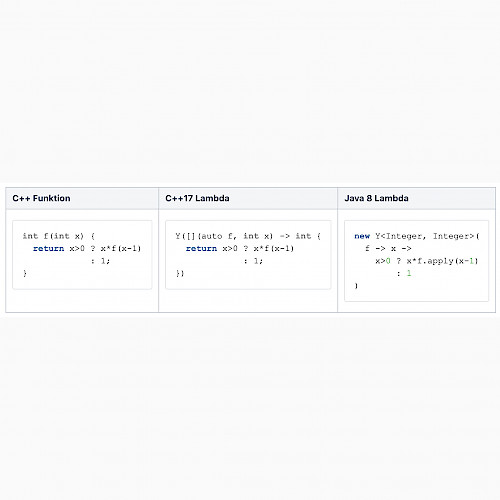
Recursion With Anonymous Function Objects
Problem: How to call an anonymous method recursively?
In the recent past, C++ (since C++11), Java (since version 8) and many other languages have been extended by "lambdas". In practice, this is a shortened notation to define an anonymous class with a functional interface and at the same time instantiate an object of this class. But how to call an anonymous method recursively?!?
Solution: The fixed-point combinator
Even though it is possible to create lambdas à la std::function<void()> f = [f]() { /* ... */ f(); }; in C++, it only works with an additional indirection (e.g. via std::function) and not inline (e.g. as parameter). For Java, it does not look any better. A more elegant way is to use the "Y combinator" (you might search the internet for "fixed-point combinator"): You replace the recursive function with a higher-order function that calls its parameter instead of itself. You put this function into the Y combinator, which repeatedly calls the function with itself as parameter.
And what does this mysterious combinator look like? Here are possible implementations in C++ (for any number of parameters of any type) and Java (with currying for the function and an additional parameter):
template <typename F>
class Y {
F f;
public:
constexpr Y(F f) : f(std::forward<F>(f)) {}
template <typename...Ts>
constexpr decltype(auto) operator()(Ts&&...ts) {
return f(*this,
std::forward<Ts>(ts)...);
}
};class Y<T, R> implements Function<T, R> {
private Function<Function<T, R>,
Function<T, R>> f;
public Y(Function<Function<T, R>,
Function<T, R>> f) {
this.f = f;
}
public R apply(T t) {
return f.apply(this).apply(t);
}
}Example
Let's have a look at the standard example for recursion, the factorial. As a function (in C++), and as a lambda in C++17/Java, it looks like in the image.
The trailing return type is unfortunately needed in C++, because otherwise the compiler triggers "auto type deduction", which leads to a cyclic dependency.

Further Aspects
- Proposal to add the Y combinator to the C++ standard library: http://www.open-std.org/jtc1/sc22/wg21/docs/papers/2016/p0200r0.html
- And do not worry about performance – an optimizing C++ compiler does not generate any overhead. See for example: https://godbolt.org/ (do not forget “volatile” when experimenting, or the compiler might optimize out the entire function)
---
Author: Andreas Swoboda / Software Engineer / Business Division Banking & Insurance
Download Toilet Paper #123: λf. (λx. f (x x))(λx. f (x x)) (pdf)
Want to write the next ToiletPaper? Apply at jambit!


